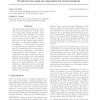Free Online Productivity Tools
i2Speak
i2Symbol
i2OCR
iTex2Img
iWeb2Print
iWeb2Shot
i2Type
iPdf2Split
iPdf2Merge
i2Bopomofo
i2Arabic
i2Style
i2Image
i2PDF
iLatex2Rtf
Sci2ools
ICML
2005
IEEE
2005
IEEE
Predictive low-rank decomposition for kernel methods
Low-rank matrix decompositions are essential tools in the application of kernel methods to large-scale learning problems. These decompositions have generally been treated as black boxes--the decomposition of the kernel matrix that they deliver is independent of the specific learning task at hand-and this is a potentially significant source of inefficiency. In this paper, we present an algorithm that can exploit side information (e.g., classification labels, regression responses) in the computation of low-rank decompositions for kernel matrices. Our algorithm has the same favorable scaling as state-of-the-art methods such as incomplete Cholesky decomposition--it is linear in the number of data points and quadratic in the rank of the approximation. We present simulation results that show that our algorithm yields decompositions of significantly smaller rank than those found by incomplete Cholesky decomposition.
Algorithm Yields Decompositions | ICML 2005 | Low-rank Decompositions | Low-rank Matrix Decompositions | Machine Learning |
Related Content
| Added | 17 Nov 2009 |
| Updated | 17 Nov 2009 |
| Type | Conference |
| Year | 2005 |
| Where | ICML |
| Authors | Francis R. Bach, Michael I. Jordan |
Comments (0)

